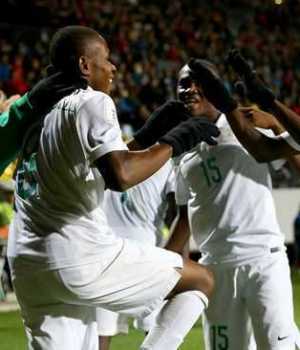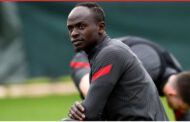Two matches into the U-17 World Cup group stage, Africa’s quartet have endured some mixed fortunes.
Of the four sides, Nigeria are the outstanding side. The Golden Eaglets sit atop Group A after two matches, having won both, accrued a maximum six points and scored seven goals. The sole goal they’ve conceded—in the 5-1 demolition of hosts Chile in Vina del Mar—is the only blemish (and that a tiny one) in a superb campaign for Emmanuel Amuneke’s side so far.
There aren’t too many other nations—if any—who take youth-level football as seriously as Nigeria, and the West African giants have every reason to do so.
The U-17 side are the most successful side in the history of the tournament, having won the title a record four times, and the early indications are that the current generation have the quality and the confidence to join some of the elite teams of the past.
Amuneke | Hoping that his Golden Eaglets can live up to Nigeria’s great teams of the past
The Eaglets saw off the United States in their opener following two goals in eleven minutes—via Chukwudi Agor and star man Victor Osimhen—before demolishing Chile in the best team performance in the tournament so far. Another of the team’s key men, Kelechi Nwakali, got on the scoresheet in this match, and has lived up to the billing so far.
The Nigerians face Croatia in their final group match on Friday, but regardless of the result, top spot in the pool is theirs.
Having cruised through the group stage, Amuneke’s boys are living up to their reputation as tournament favourites. However, the real tests will come in the knockout rounds, as the pressure to perform—and the echoes of history—weigh upon the Eaglets’ youthful shoulders.
South Africa’s Amajimbos also entered the tournament with big expectations, but for different reasons.

Amajimbos | A symbol of South Africa’s sporting future?
Following the national teams’ malaise of the early decade, the country’s international sides were renovated, with a new grassroots policy implemented with a view to improving Bafana Bafana’s performance in major tournaments.
The nation’s U17 side are among the first fruit of this approach, and as such, their performance in Chile has taken on extra meaning. Not only is it simply an opportunity to examine some of the country’s most promising youngsters, but also a chance to gauge the success of SAFA’s master plan.
So far, the jury’s out.
The Amajimbos were defeated in their opening match against Costa Rica in Concepcion; having fallen behind in the seventh minute, they never recovered, falling to a 2-1 defeat.
In their second match, against North Korea, they took the lead through a 10th-minute penalty from Thendo Mukumela, but conceded themselves only seven minutes.
The 1-1 draw may not completely end South Africa’s hopes of a spot in the Round of 16—particularly with the four best third-placed teams advancing—but their performance against 10-man North Korea, particularly in the second half, didn’t provide too much reason for optimism.
Similarly, the fact that the Amajimbos still have to face Russia—who convincingly overcame Korea in their opener—means that Molefi Ntseki’s side still have much to do.
While Sibongakonke Mbatha and Athenkosi Dlala deserve praise for their competent performances in the tournament to date, too few players have stepped up and shown their class on this elevated stage. Worrying anonymous has been skipper Nelson Maluleke who—for now at least—is struggling to carry the burden of captaining the side on his shoulders.

Maluleke | The skipper has failed to come to the party in Chile thus far
South Africa meet Russia in their final—and decisive—group fixture on Monday.

Francophone pair Guinea and Mali have, between them, won one, drawn two, and lost one. The latter are enjoying the stronger start, and find themselves joint first in Group D after two matches.
Their four points leave them equal with Belgium—with whom they drew their opener—across the board, and they will look to secure top spot with victory over Honduras in their final group match on Saturday. Africa’s U-17 champions demonstrated their class during the continental tournament in Niger earlier this year, and are a tight unit with experience of overcoming major obstacles together.
Guinea, by contrast, started their campaign with an admirable 1-1 draw with England; having fallen behind in the 61st minute, the West Africans—making their first appearance in the competition—secured a point after a 76th-minute equaliser by Naby Bangoura.
However, a last-minute goal by Oh Se-hun in their second group match against South Korea cost Guinea the chance to head into their final group match unbeaten. That fixture is against Brazil—who sit in second on three points—meaning that Guinea need to improve significantly in order to escape a first-round elimination.Goal.com














